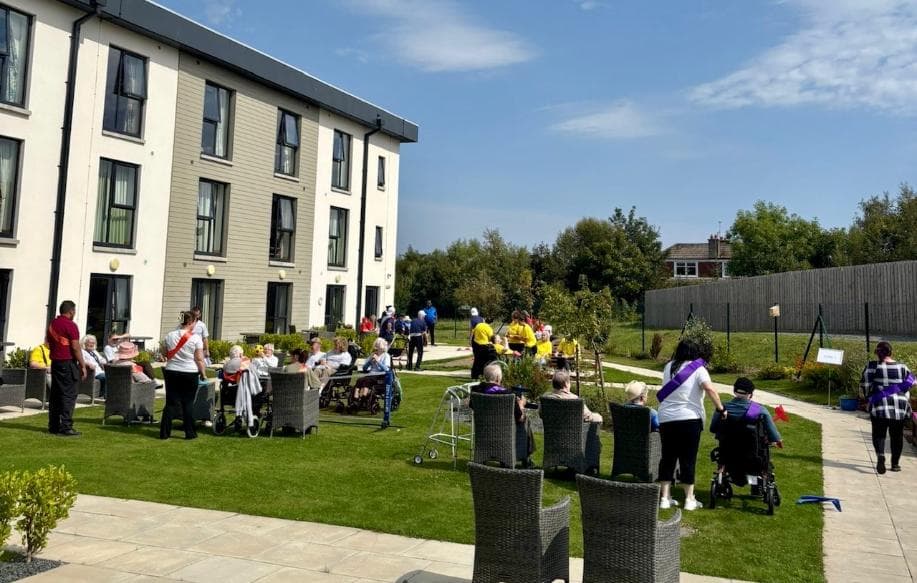Why is Meaningful Activity Important for Care Home Residents
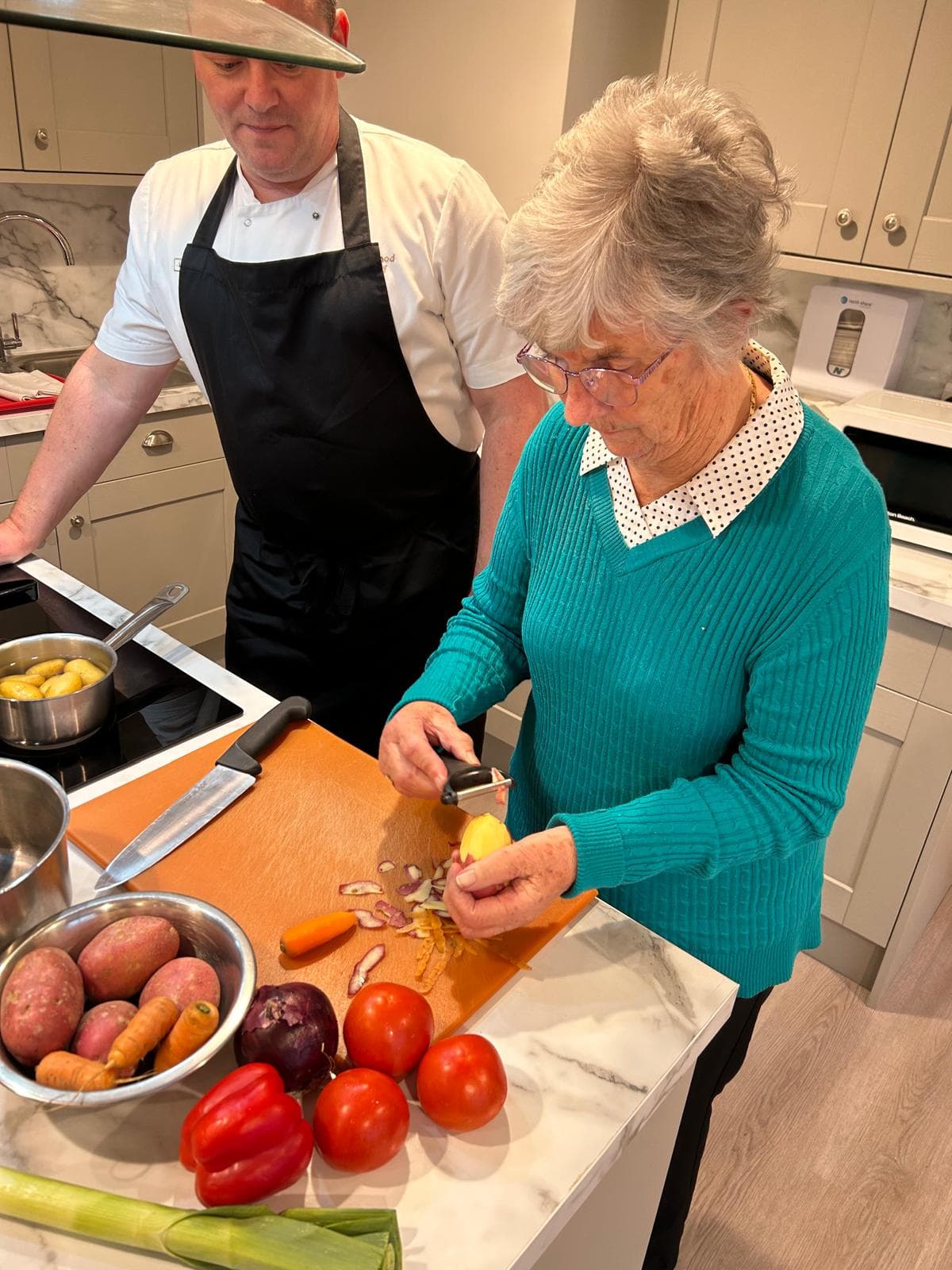
Meaningful activity plays a huge role in supporting the wellbeing of older people, particularly those living in care homes. These activities do more than simply fill time; they help residents feel valued, connected, and fully engaged in life on a daily or weekly basis. As people age, they often face challenges like reduced mobility, changes in cognitive ability, or the loss of loved ones. These changes can lead to feelings of isolation or a lack of purpose, but meaningful activities actively counter these challenges, enhancing mental and physical health while boosting emotional resilience.
Care homes that prioritise meaningful activity ensure that their programmes reflect the personal preferences, abilities, and life experiences of each resident. Some residents find joy in creative activities such as painting or knitting, while others feel fulfilled by leisurely tasks like gardening or baking. Art classes are also a popular choice, fostering community, joy, and personal fulfilment among residents. Social interactions also play a central role in these activities, helping residents build connections and strengthen relationships with others in the home.
Benefits of Meaningful Activities
Care homes that prioritise these activities ensure that every resident has the opportunity to thrive rather than simply pass the time. By engaging in activities they enjoy, residents find purpose, stay connected to others, and feel a greater sense of fulfilment.
One of the most significant benefits of meaningful activities is the sense of connection they create. When residents share experiences with others, they form friendships and deepen their bonds with staff and fellow residents. This social interaction reduces feelings of isolation and fosters a welcoming, community-oriented environment where everyone feels included and valued.
Care homes that tailor activities to individual needs and preferences provide residents with a sense of personal fulfilment. For example, a resident who loves cooking may find joy in helping prepare meals, while another with a passion for gardening might enjoy planting flowers in the home’s outdoor spaces. By drawing on each person’s unique interests and talents, care homes ensure that activities feel personal and engaging.
The Impact on Mental Health
Supporting mental health is about more than just creating a comfortable environment; it requires thoughtful activities and interactions that actively promote positivity, engagement, and a sense of purpose. When residents feel mentally stimulated and emotionally supported, they are far more likely to maintain a positive outlook on life.
Good care homes understand the vital link between meaningful activity and mental health. Most employ dedicated activity coordinators or staff who focus on creating opportunities for residents to enjoy life, connect with others, and feel a sense of achievement. These staff members take the time to get to know each resident as an individual, identifying their interests and tailoring activities to suit their preferences, abilities, and elements from their personal life. This personalised approach is at the heart of person-centred care, where every resident is treated with respect, dignity, and an understanding of their unique needs.
Understanding each resident's life stories allows the activities team to create engaging programs that foster mental and physical well-being. Activities such as reading, singing, gardening, or solving puzzles can calm the mind, stimulate memory, and provide an outlet for self-expression. Even small, quiet moments of enjoyment—like tending to plants or flipping through a photo album—can bring immense comfort and reduce feelings of anxiety or stress.
Social activities, in particular, have a significant impact on mental health. Group events, from arts and crafts to quiz nights, allow residents to connect with others, form friendships, and share laughter. These connections reduce feelings of loneliness, which can otherwise take a toll on emotional wellbeing.
Outings and experiences outside the care home also provide an invaluable boost to mental wellbeing. Day trips to local gardens, cultural sites, or even the seaside give residents a refreshing change of scenery and an opportunity to experience something new. These outings can reignite memories, inspire conversation, and offer a sense of adventure that brings joy to everyday life.
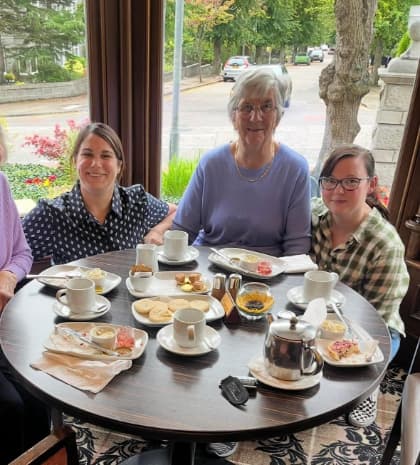
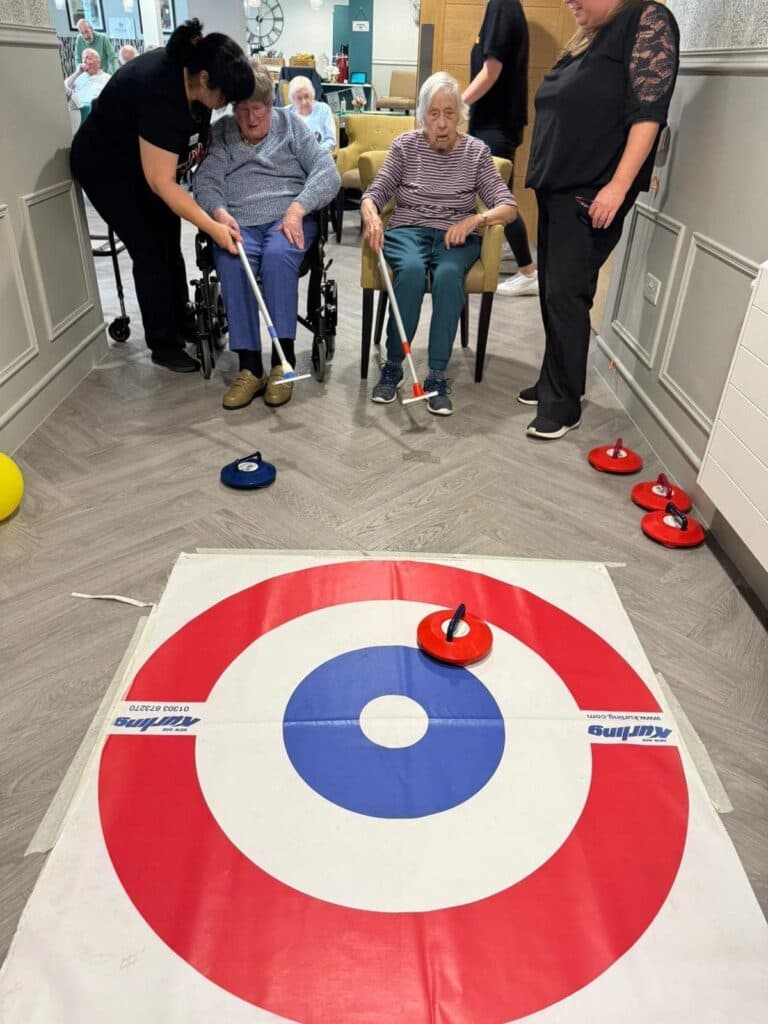
The Role of Physical Wellbeing in Positive Ageing
Care homes that prioritise meaningful physical activities ensure residents have regular opportunities to move and exercise in ways that suit their abilities, including gentle exercise classes. For some, this might mean taking part in a seated exercise class, while others may enjoy a brisk walk in the garden or a gentle game of bowls. These activities are not only beneficial for improving strength, balance, and coordination but also provide a sense of accomplishment and fun, helping residents feel energised and engaged.
Regular physical activity offers many health benefits that become even more important with age. Exercise can improve flexibility, reduce joint pain, and help prevent conditions like heart disease, strokes, and osteoporosis. It also supports better circulation and improves immune system function, making it easier for residents to stay well and recover more quickly from illness.
Physical activities in care homes don’t need to be strenuous to have a positive impact. A short walk around the grounds, gentle yoga, or even simple stretching exercises can help residents maintain mobility and feel more comfortable in their movements. Dancing, for example, is a wonderful way to combine light exercise with music and social interaction, while gardening allows residents to engage with nature while staying active. These shared experiences promote social engagement and make physical activity feel like a joyful part of everyday life rather than a chore.
The Role of Technology in Meaningful Activities
Technology has become an increasingly valuable tool for enriching the lives of care home residents and creating new opportunities for meaningful activity. While traditional activities remain important, technology offers an exciting way to enhance engagement, stimulate the mind, and connect residents with loved ones and the wider world. Thoughtfully integrated into daily life, technology can bring immense joy and a sense of possibility to older people, while also fostering connections with the local community.
One of the most significant ways technology supports meaningful activity is by helping residents stay connected with family and friends. Video calls using tablets or smartphones enable residents to see and talk to their loved ones, even when they can’t be together in person. Whether it’s a regular virtual catch-up with family or attending a grandchild’s birthday party online, these moments of connection reduce loneliness and strengthen relationships.
Technology also provides endless opportunities for mental stimulation and learning. Interactive apps, games, and puzzles can help residents exercise their minds, improve memory, and build problem-solving skills in a fun and engaging way. For example, digital brain-training games can provide a refreshing mental workout, while apps designed for reminiscence therapy allow residents to revisit treasured memories through photos, music, and stories.
Technology can also be a powerful way to bring the outside world into the care home. Streaming services allow residents to watch live performances, attend virtual church services, or join online workshops and classes. These experiences help residents feel connected to their community and the wider world, creating a sense of inclusion and belonging.
By introducing technology thoughtfully and tailoring it to individual preferences, care homes can offer residents exciting new ways to engage, connect, and explore. This approach helps build a wonderful care home community. Technology doesn’t replace traditional activities, but it adds another dimension to meaningful care, ensuring residents have access to a rich variety of experiences. When used creatively, it can transform daily life, bringing joy, stimulation, and connection to everyone involved.
Addressing Barriers to Participation
While meaningful activities in care play a vital role in enhancing residents’ quality of life, not every individual will feel ready or able to take part. Some residents may face physical challenges, cognitive impairments, or emotional barriers that make joining activities feel daunting. Others may simply prefer quiet moments or find social settings overwhelming. A compassionate and personalised approach is essential to overcome these barriers and ensure that every resident has the opportunity to enjoy meaningful activity in a way that works for them.
Physical limitations, such as reduced mobility or chronic pain, can make it difficult for residents to take part in certain activities. To address this, care homes should offer adapted or alternative options that suit a wide range of abilities. For example, seated exercise classes provide a safe and comfortable way for residents with mobility issues to stay active, while activities like crafts or baking can be modified to accommodate limited dexterity. Thoughtful planning ensures that no one is excluded and that residents feel empowered to participate without fear of discomfort or difficulty.
Cognitive impairments, such as those caused by dementia, may also present challenges. In these cases, staff can focus on creating activities that are simple, familiar, and enjoyable, helping residents feel calm and capable. Activities like reminiscence therapy, music sessions, or sorting familiar objects tap into long-term memory and create moments of success and joy. Patience and flexibility are key, as residents with cognitive challenges may need extra time or encouragement to take part.
Emotional barriers, such as shyness, anxiety, or low confidence, can also prevent residents from engaging in group activities. Care staff can help by gently encouraging participation in smaller, more intimate settings where residents feel less pressured. Building trust through one-to-one interactions can help nervous residents feel more comfortable and willing to join in over time. Staff might also offer activities that align with a resident’s personal interests, providing a familiar and reassuring starting point.
It’s important to celebrate small achievements and progress, no matter how modest they may seem. Purposeful and meaningful activity can significantly enhance the mental and physical wellbeing of care home residents. For example, a resident who once hesitated to join a group activity might start by watching from the sidelines before eventually taking part. Recognising and praising these moments builds confidence and reinforces a sense of belonging.
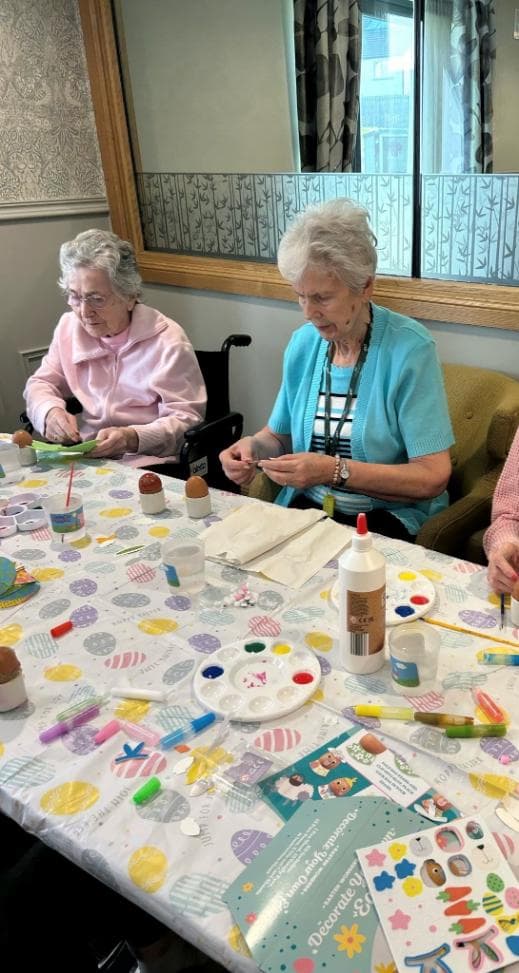
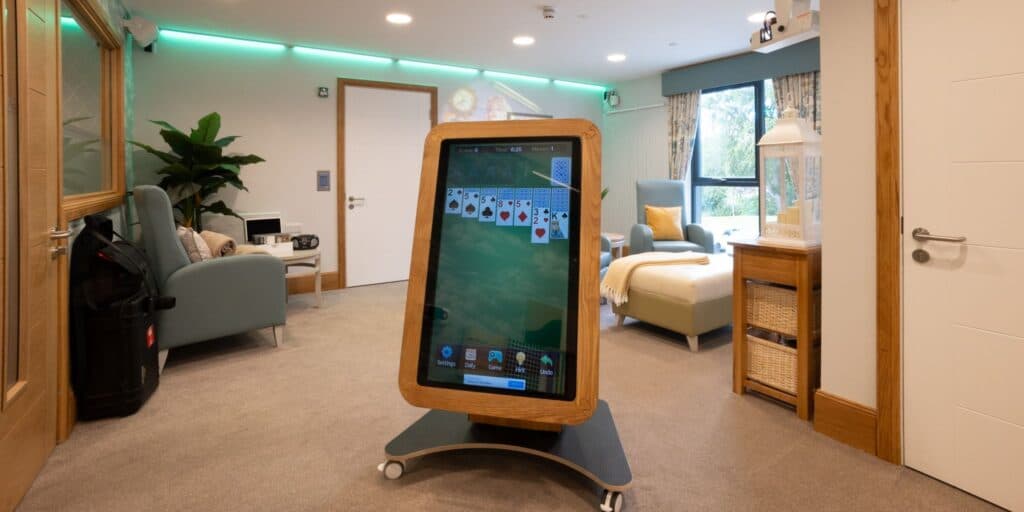
Activities at Woodlands Care Home
Woodlands Care Home in Aberdeen is dedicated to helping residents age positively by providing a warm and supportive environment where they can enjoy fulfilling, active, and meaningful lives. Through personalised care and a wide range of thoughtfully planned activities, Woodlands empowers residents to maintain their physical health, nurture their mental wellbeing, and build strong social connections. Whether it’s through gentle exercise, creative pursuits, or vibrant community events, we focus on enabling our residents to embrace later life with confidence and purpose.
For more information about Woodlands Care Home and the outings and activities our residents enjoy, please get in touch to book a tour or download a brochure.



